George Skipper was in a hurry.
Having overslept, the D-Day veteran gunned his mobility scooter across the quad at the Royal Hospital Chelsea, the tail of his scarlet coat flapping as he raced to an interview about the Allied landings in Normandy. He just missed a historic cannon, but splinters flew when he misjudged the width of a doorway. A hospital official urged him to slow down, but he pressed on.
Seventy-five years after Skipper splashed ashore on Gold Beach, the former working-class lad from London's East End is still doing his duty. These days, it's reminding younger generations about the sacrifices of those who didn't come back.
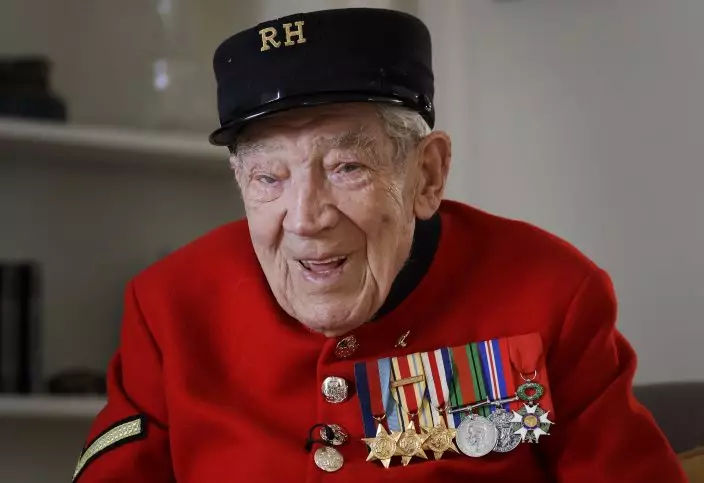
In this May 7, 2019, photo, Chelsea Pensioner and D-Day veteran George Skipper speaks during an interview with Associated Press at the Royal Hospital in Chelsea, London. While the anniversary provides a welcome platform for Skipper, it's also hard on him. He wonders why he survived and others didn't. (AP PhotoKirsty Wigglesworth)
"I lost two of my best friends in it, they got killed," Skipper, now 96, told The Associated Press during an interview at the historic home for retired soldiers. "We lost a hell of a lot of men on D-Day, hell of a lot of men. But then again, when you come to think of it, when the war was on, life was very cheap for the soldiers. They were getting killed left, right and center."
With the number of survivors dwindling every year, men like Skipper are on a mission to share their experiences —aware that this is probably the last big anniversary of their lifetimes.
About 160,000 British, American and Canadian troops landed on the beaches on June 6, 1944, with more than 2 million taking part in the campaign before Allied forces broke out of Normandy and started their march to Paris to take back occupied France. Almost 73,000 Allied troops were killed.
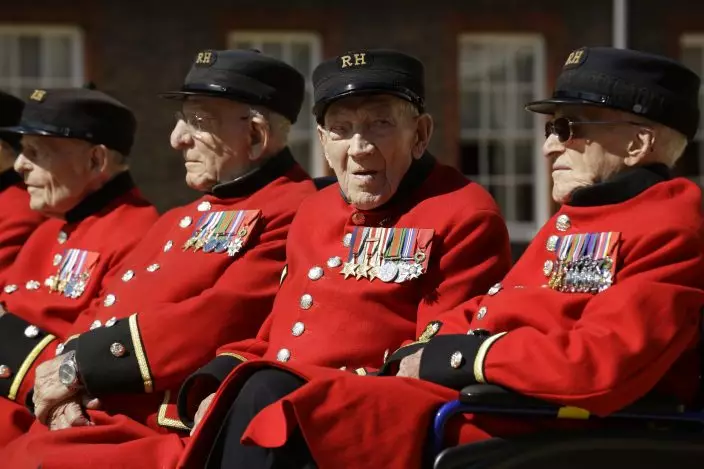
FILE - In this May 13, 2019, file photo, British Chelsea Pensioners who are veterans of the World War II Battle of Normandy, codenamed Operation Overlord, and D-Day pose for a group photograph during a D-Day 75th anniversary event at the Royal Hospital Chelsea in London, Monday, May 13, 2019. The 75th anniversary of D-Day is on June 6. Pictured from left: Ernie Boyden, Frank Mouque, George Skipper and Arthur Ellis. (AP PhotoMatt Dunham, File)
This year, Skipper is going back on a specially chartered ship for Normandy veterans. It won't be the first trip for many of them, as some go every year. But Skipper says this year is special. If nothing else, because people are listening to his story.
Skipper was just 16 when the war broke. He'd grown up so poor that he shared a bed with three siblings and would pick bread off the ground and soak it in water to soften it, so he could eat it. His father was often drunk. His mother would scrub down ships on the docks to keep the family alive. Even as a kid, took odd jobs and loaded Johnnie Walker whisky on horse-drawn carts.
He was playing cards at home with his brother when Prime Minister Neville Chamberlain came on the radio, telling the nation that Britain would declare war if Adolf Hitler didn't leave Poland.
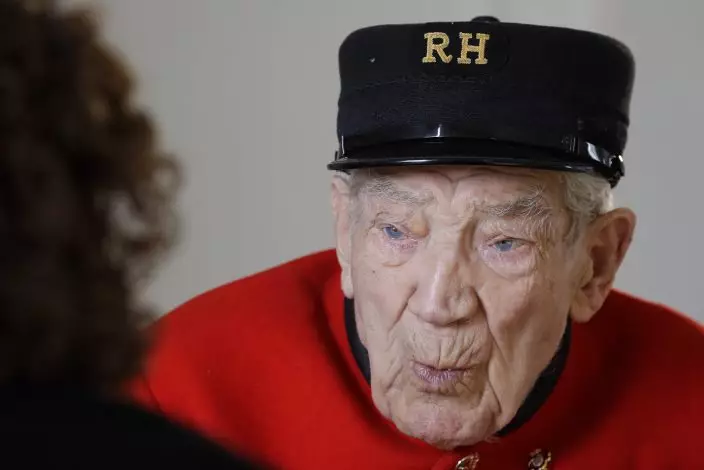
In this May 7, 2019, photo, Chelsea Pensioner and D-Day veteran George Skipper speaks during an interview with The Associated Press at the Royal Hospital in Chelsea, London. Skipper said he wants to keep returning to Normandy for as long as he is able, even if he's the only one. He worries that the world, and young people in particular, have forgotten what happened on D-Day. (AP PhotoKirsty Wigglesworth)
It was not long after that air raid sirens became the norm, their two-tone wail warning Londoners to take shelter.
A champion boxer and dancer, Skipper was called up for active duty with the Royal Army Service Corps when he was 18. He'd never been farther than the farms of Kent, south of London, before the Army sent him to North Africa where he spent 14 months with Field Marshal Bernard Montgomery's famed Desert Rats.
Returning to Britain in the buildup to D-Day, Skipper found himself chauffeuring colonels and generals around London. He knew the city, which could be difficult to navigate in blackout conditions, and recognized that his passengers appreciated a polished appearance. He figured out a way to keep his trousers creased and his boots shiny.
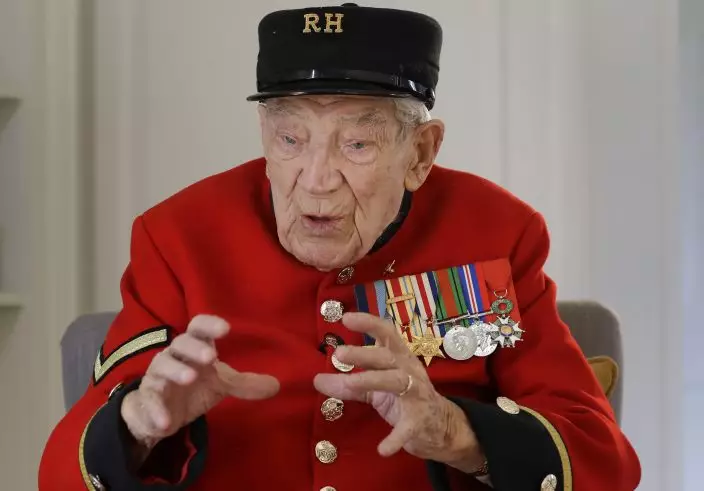
In this May 7, 2019, photo, Chelsea Pensioner and D-Day veteran George Skipper speaks during an interview with The Associated Press at the Royal Hospital in Chelsea, London. Seventy-five years after Skipper splashed ashore on Gold Beach, he is still doing his duty. These days, it’s reminding younger generations about the sacrifices of those who didn't come back. (AP PhotoKirsty Wigglesworth)
In May 1944, he got two days off and married his fiancee, June, a member of the Women's Auxiliary Air Force who helped service barrage balloons. The reception featured four quarts of brown ale and lettuce sandwiches in his mother's living room.
One week later, Skipper found himself at London's Victoria Docks boarding the ship that took him to Normandy.
"It all happened so quickly," he recalled. "We were on a boat that took us inland and (then) we jumped over onto a flat-bottomed boat and in we went."
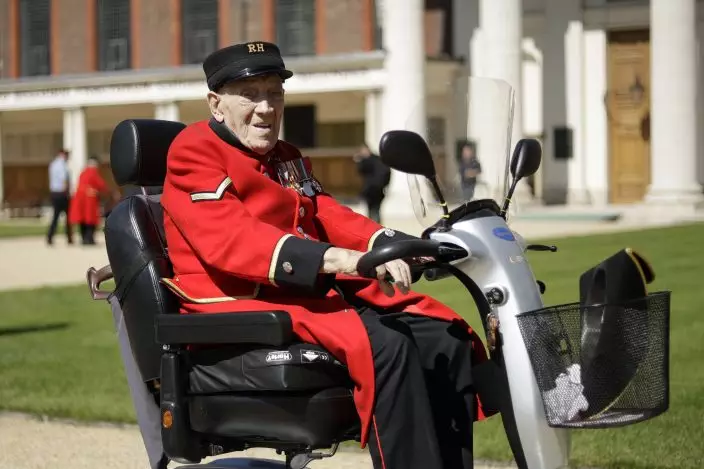
In this May 13, 2019, photo, British Chelsea Pensioner and D-Day veteran George Skipper, who served in the British Royal Army Service Corps drives away after posing in a group photograph during a D-Day 75th anniversary event in the State Apartments at the Royal Hospital Chelsea in London. With the number of survivors dwindling every year, men like Skipper are on a mission to share their experiences. (AP PhotoMatt Dunham)
The soldiers were ordered to jump out into water their officers believed was knee deep. But an unseen bomb crater meant the heavily-laden infantrymen couldn't touch bottom.
Skipper could swim, but others couldn't. After urging his comrades to pretend they were "jumping on their toes," he swam to shore, threw off his pack and came back to help the others.
"I got back and pushed them in," he said. "They said you would get a medal for this ... (but) all I got was soaking wet."
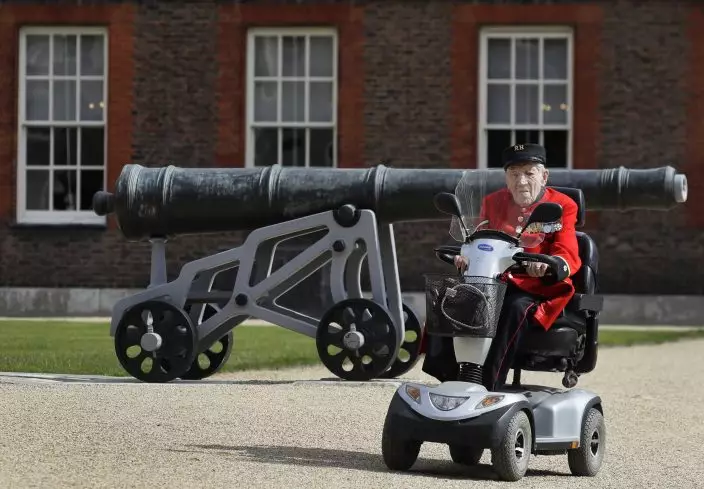
In this May 7, 2019, photo, Chelsea Pensioner and D-Day veteran George Skipper arrives on his mobility scooter for an interview with The Associated Press at the Royal Hospital in Chelsea, London, Tuesday, May 7, 2019. With the number of survivors dwindling every year, men like Skipper are on a mission to share their experiences. (AP PhotoKirsty Wigglesworth)
The beach was chaos. German bombers overhead, machine guns rattling, dead bodies in the water, hundreds of boats delivering men and equipment to the beach, soldiers shouting "Come on!"
Skipper said he survived because he just kept going.
"When you come to think of it, you don't know what to expect," he said. "The Germans are shooting down at us and we are shooting back at them. If you get a stray bullet that hits you, you've had it. I made sure I didn't get up to the front."
Seventy-five years later, the medals gleaming on Skipper's chest belie his insistence that it was better to be a live coward than a dead hero.
Skipper moves more slowly now, at least when he's not on his scooter. He has trouble hearing, and he took a fall a few days before the interview, which shook him up a bit. But viewing it as his duty, he showed up for a photo shoot with the hospital's other Normandy veterans, who looked sharp in their scarlet coats that identify them as members of this British institution.
While the anniversary provides a welcome platform for Skipper, it's also hard on him. He wonders why he survived and others didn't.
"I'm 96 years old, I've still got a good memory, I must have done something good to still be here," he said.
Skipper said he wants to keep returning to Normandy for as long as he is able — even if he's the only one. He worries that the world, and young people in particular, have forgotten what happened on D-Day —how men died when they ran up a beach raked by machine gun fire to support each other.
"Well, I often wonder, was it worth it?" he said of the sacrifice. "I don't think it was because no-one takes no notice now. Now, it's all forgotten. Isn't it?'"










